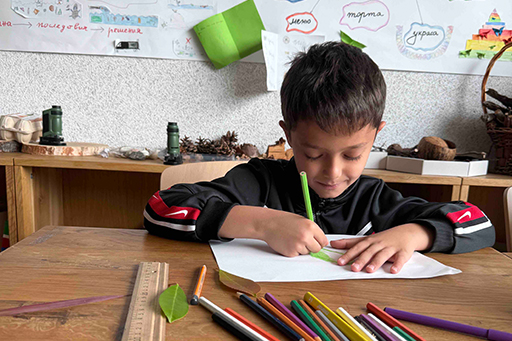
Peter
When Peter first walked into Denis Diderot School, everything felt foreign to him—words, numbers, rules, the other children.
He stood aside, watched, stayed quiet. Didn’t resist or act out. Simply didn’t join in—afraid he wouldn’t be understood.
Peter comes from a community where education isn’t part of daily life, but more of a distant idea. He hadn’t attended school regularly, didn’t know the letters, couldn’t count with confidence or express a thought on his own. Participation in class was rare, and confusion would often lead him to shut down completely.
Every unfamiliar task felt like a wall. Even the simplest instructions required patience and support from his teachers.
And then, he started joining in…
Today, Peter can recognize all the letters he has learned, read short texts, and build meaningful sentences. He loves retelling stories and often notices details others overlook.
During one activity, he illustrated his favorite moment from a story and presented it to the class—calm and confident.
In math, he can count to 20, solve basic addition and subtraction problems, and recognize geometric shapes. Most importantly—he’s no longer afraid of the work. Where he once avoided questions, now he asks. And explores.
He particularly stands out in science and applied learning—where sorting, coding, and logical thinking come into play. Tasks like working with a robot, solving puzzles, or following visual instructions are no longer obstacles—they’re a language he understands.
Peter doesn’t like chaos. His thinking seeks structure, his actions — meaning.
That’s what makes him different. He doesn’t look for a stage to stand on, but focuses on the result. He’s not driven by competition, but by the satisfaction of getting it right.
He works slowly, with intention. And when he’s ready—he has something to show.
He learns the way he thinks: in order.
When not studying, he creates. Art is another way he processes the world.
Animals and trees made from clay often appear in his work, linking what he learns in science to what he sees around him. His projects reflect observation, depth, and thought.
And even though he doesn’t talk much, when asked about his choices—he always has a thoughtful answer.
Socially, Peter is no longer the same child we met at the start of the year. Where he used to shut down, he now asks for help. He joins group activities and often encourages others.
And the most important part?
He knows when to ask for help—and when to calmly say: “I can do it myself.”
Peter is one of the children supported by a scholarship from the School for Every Child Association.
This support doesn’t just give him access to education—it gives him the chance to learn in a way that allows him to be himself, without pressure or comparison.
This is Peter's story.
And if you believe every child deserves to move at their own pace—become part of what we do.


